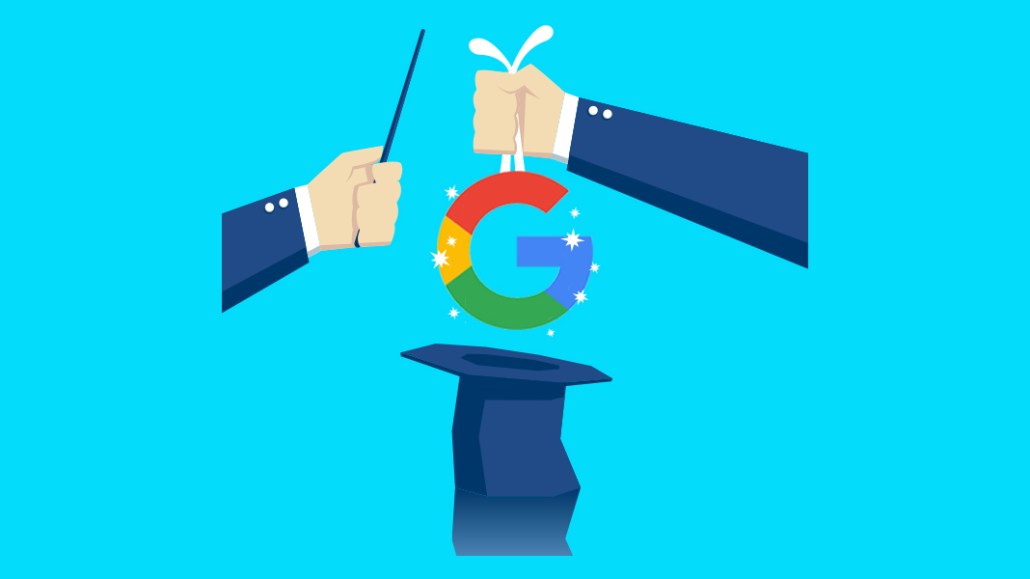Save 50% on a 3-month Digiday+ membership. Ends Dec 5.

So long, DoubleClick. Google is doing away with the DoubleClick name, 22 years after launch and 11 years after the tech company acquired the ad tech platform, as part of the company’s rebranding of its advertising suite.
Google executives announced the change on Tuesday during a press event at YouTube’s creator space in New York. While the changes to Google’s ad products are minimal, Google kicked off its an hour-long presentation with one of the big reasons why it was hosting it in the first place rather than just publish a blog post.
“It’s the first time in 18 years that we’ve changed the names of our products under new product lines,” said Google’s comms director Chi Hea Cho.
The tools within DoubleClick aren’t disappearing. Rather, they’re being worked into two out of the three of Google’s new buckets of ad products. It’s simply the name and the brand we’re losing now after more than two decades.
“We’re sunsetting the DoubleClick brand. We believe this will bring together the best tools to help them optimize,” said Dan Taylor, Google’s managing director of platforms. “We’ve seen marketers get the most value of our products when they use ads and analytics solutions together, our best customers are doing that on a regular basis and seeing results, but we can’t take credit for making that easier.”
Jonathan Bellack, director of product management for publisher ad platforms, was at the event and shared he joined Google after its acquisition of DoubleClick, having joined that company in 2004 in product management. As Bellack said, the advertising world is evolving, and now so must Google’s brands.
“We live in a shifting ecosystem. Content consumption is on new surfaces, programmatic across deals and platforms. There are higher standards for transparency, control and ad experiences,” Bellack said.
Now, Google’s ad ecosystem has three buckets: Google Ads, Google Marketing Platform and Google Ad Manager. Here’s what that looks like:
Google Ads
- Formerly called Google AdWords
- Buying ads on Google.com, other Google properties (YouTube and Google Play), partner sites and apps
Google Marketing Platform
- Formerly DoubleClick and Google Analytics 360 Suite
- Helps marketers plan, buy, measure and optimize campaigns on Google
- Introducing Display & Video 360 that consolidates Google’s display advertising products
Google Ad Manager
- Formerly DoubleClick for Publishers and DoubleClick Ad Exchange
- Tool for publishers to monetize content across connected TVs, Accelerated Mobile Pages and apps
The update is a “set of solutions for agencies, advertisers, publishers that offer transparency, that offer real value and that offer choice. The first principle we always believe in is relevant advertising that works with our users,” said Sridhar Ramaswamy, senior vp of ads at Google.
Ramaswamy said the move was not about favoring direct relationships with advertisers over working with agencies. The change also has little effect on the user experience.
The only update to ad formats was designated for small-business owners. Google is launching “Smart Campaigns,” a new term for the default experience when new advertisers sign up for Google ads, said Kim Spalding, Google’s gm and product lead for small-business ads. These Smart Campaigns will include auto-optimized landing pages, where the landing page to a website matches the ad that led a user there. Later this year, Google will launch Image Picker, a product that makes it easier for advertisers to select images for ads.
“We’re doubling down on small businesses because when small businesses grow, so does our community,” Spalding said.
Indeed, Facebook and Snap have focused on growing its small-business customers over the last few years. Sheryl Sandberg, Facebook’s chief operating officer, touts the success of small-business advertisers during her company’s quarterly earnings calls. When it comes to the products, both Facebook and Snap have worked to make it easier to create and to buy ads in minutes. Of course, for Facebook, some of that ease has been restricted in light of Russian interference in the 2016 U.S. election via its platform.
Ad position: web_incontent_pos1
During the event, Google executives also emphasized the company’s focus on privacy. A slide from the presentation simply read, “Privacy first platform.”
“At Google, we take [privacy] very seriously across all of our products, and Google Marketing Platform is no different,” Google’s Taylor said.
Yet Google didn’t reveal any updates to privacy settings for users or for advertisers. Google did share that it was one of the early adopters of the Interactive Advertising Bureau Tech Lab’s ads.txt initiative that helps ensure transparency and prevent spam.
Advertisers will start to see the new brands and the sunsetting of DoubleClick over the coming days and weeks. Google said it will announce new campaign types at its Google Marketing Live event on July 10.
More in Marketing

Ulta, Best Buy and Adidas dominate AI holiday shopping mentions
The brands that are seeing the biggest boost from this shift in consumer behavior are some of the biggest retailers.

U.K. retailer Boots leads brand efforts to invest in ad creative’s data layer
For media dollars to make an impact, brands need ad creative that actually hits. More CMOs are investing in pre- and post-flight measurement.
Ad position: web_bfu



